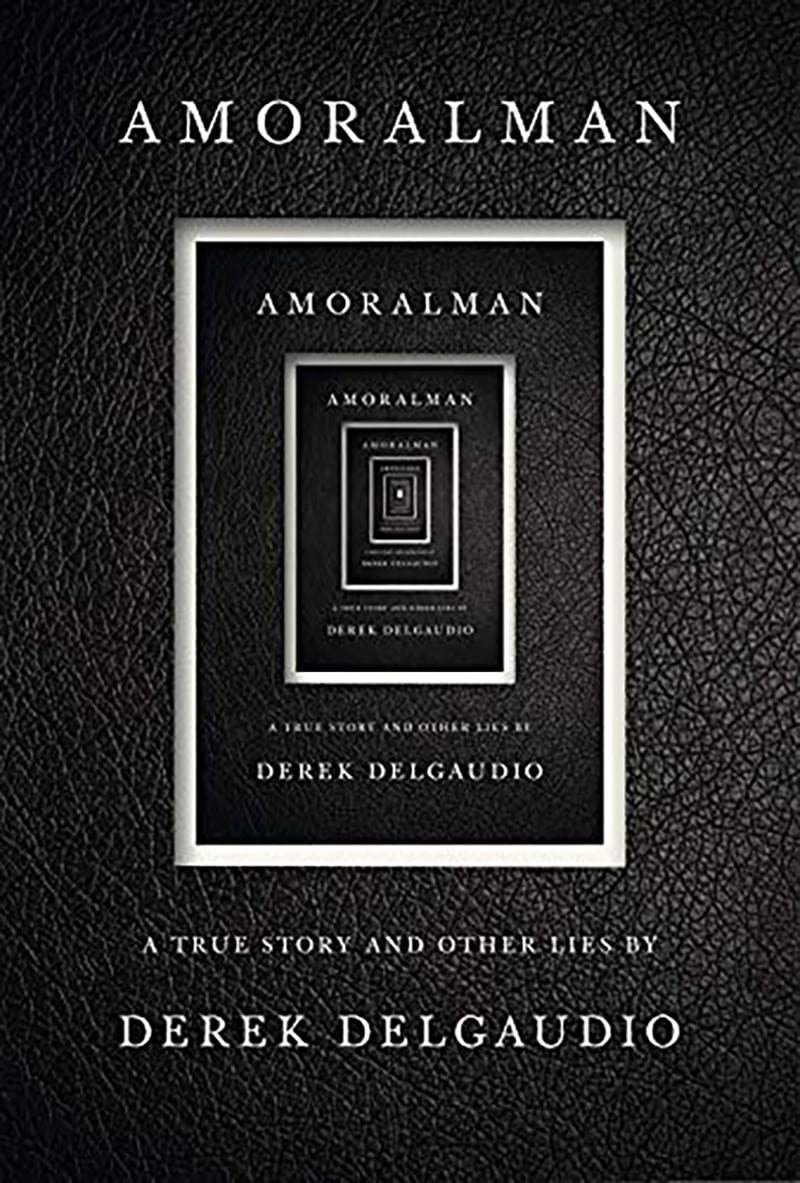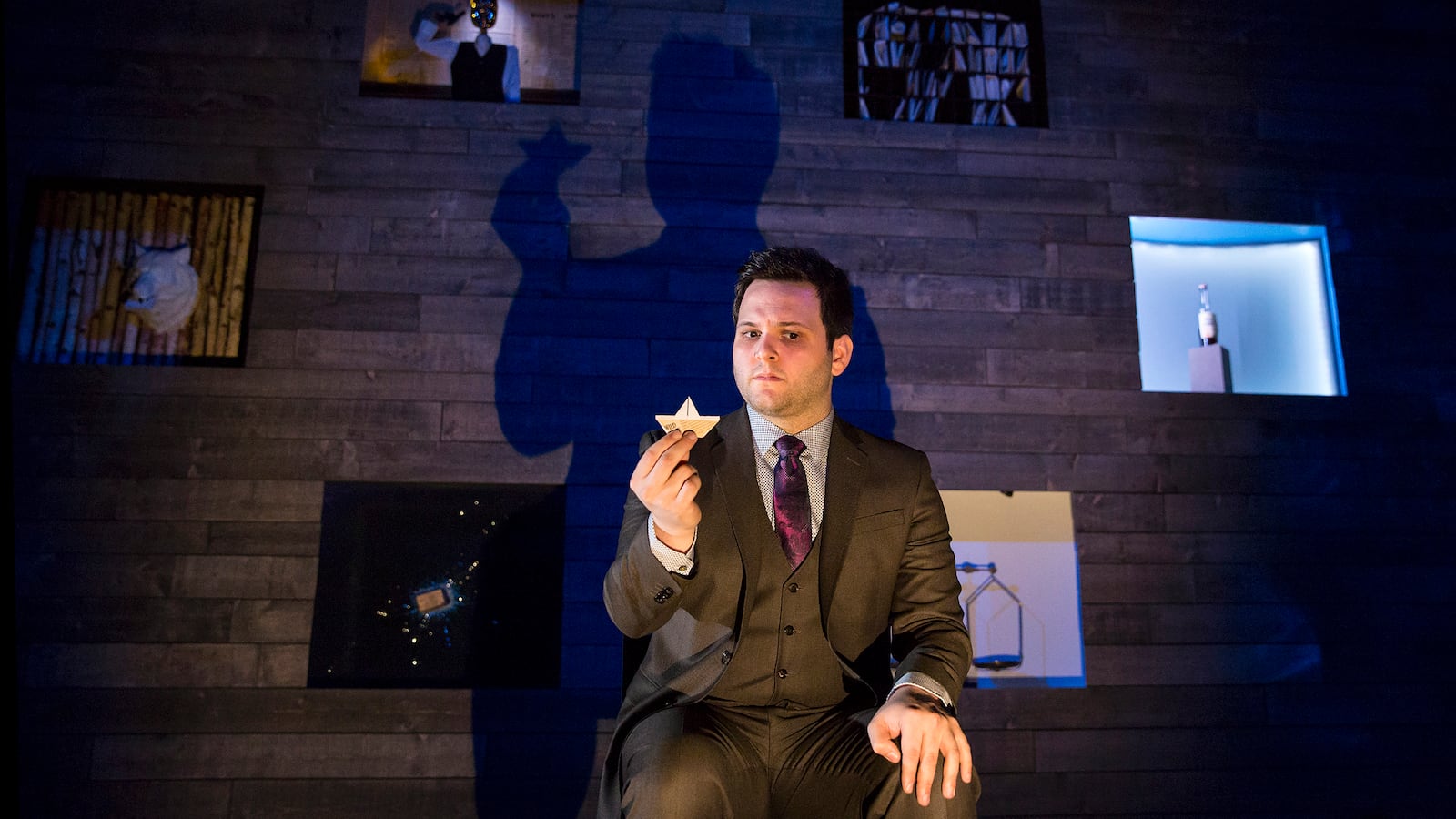[Caution, this article contains spoilers regarding the ending of the book in question.]
At the very end of his brilliant new memoir Amoralman, the magician Derek DelGaudio offers his reader a little piece of thread that if pulled hard enough might unravel everything that’s come before. That is, he dares you to contemplate the idea that everything he’s told you so far is a lie. The extraordinary thing is that this offer enhances rather than undercuts his story.
Here’s how that plays out: At the beginning of the book, DelGaudio tells about a period in his distant past—distant enough, anyway, for the statute of limitations to have run out—when for six months or so he made his living dealing crooked poker games. In particular he describes a game in which one player kept losing money until he was broke and finally pulled a gun. Turned out he only wanted to know what he could get for the piece to stay in the game. Big exhale. Then, at the end of the book, DelGaudio recounts his last meeting with Ronnie, the card mechanic who’d taught him how to deal a crooked game, and Ronnie tells of the time he dealt a game where a guy pulled a gun—precisely the same story DelGaudio told earlier.
“You should put that in your book,” Ronnie tells him, adding, “Just don’t mention me. Say it happened to you.”
“But it didn’t,” DelGaudio protests.
“They’ll never know the difference.”
Which does make a reader wonder just how much of what he’s been told for 233 pages is true. Which is, pretty obviously, DelGaudio’s point: He wants us to doubt. He wants us to at least consider the possibility that he is the most unreliable narrator in the history of storytelling. He wants us to ask why we would assume that when a magician, someone who deceives for a living, turns to memoir writing, he’s suddenly doing everything on the square? It’s a very good question. And you can’t say you weren’t warned on the way in: The subtitle of Amoralman, right there on the cover, is “A True Story and Other Lies.”
In at least one subset of magic—card tricks—magicians took a lot of what they know from card cheats: bottom dealing, second dealing, false shuffles and cuts, and so on. Magic routines learned from card sharks are foolproof if performed correctly, because there is no higher bar for dexterity and deception than cheating someone at cards. Fumble a magic trick, and you face embarrassment. Get caught cheating, and you face a beating or worse. The buy-in for the game DelGaudio dealt in L.A. was ten grand.
Both card cheats and magicians lie for a living. The difference is, with card cheats, that’s where things stop, while magicians take things a step further. While they too deceive and dupe and even destroy things (the lady sawed in half, the rope cut into pieces), they also make them whole again. They are benign and, in a roundabout way, honest: you know you’re being tricked, that’s the whole point.
Magicians are also a little like poets and not just because they both have small audiences composed mostly of their respective peers or merely because mass culture has room for only one or two famous magicians or one or two well-known poets at any given time: Robert Frost, Maya Angelou, Amanda Gorman, Billy Collins, David Copperfield, Ricky Jay, Penn & Teller.
Both poetry and magic make rigorous demands on their practitioners, both have something almost musical in their actions, and both have the ability to take the everyday world, turn it inside out, and make us gawp at the result.
The best magicians include some emotional element in their routines. When Teller slices the shadow of a rose and the actual rose drops petals with every cut, we are astonished but we are also strangely moved.
That’s where DelGaudio takes us in his book and in his stage show, In and of Itself, which ran for more than a year in New York and is now available to watch on Hulu. Some parts are more overtly emotional than others, such as when he does a trick with a brick that he has associated with the brick thrown through the apartment window where he and his lesbian mother lived when he was a small child in a Colorado town overrun with Christian bigots.
But the most beautiful and poetic moment for me was his routine with playing cards, which he constructs with a slowly building momentum that achieves the tide-like crescendo of a symphony—and elicits an almost jaw-dropping incredulity in the audience, when in fact all he’s doing is showing us the various ways he cheated at cards.
This is, of course, what separates the card cheat and the magician, and what elevates the best card magic to the level of poetry: cheating is merely utilitarian, while card magic, like poetry, is both useless and beautiful, and those two qualities are inseparable.
Play word association with most people today, and the first thing they’ll probably say if you say “magician” is “children’s birthday parties.” Most magic isn’t hip. If it’s known at all, it’s for the gaudy likes of the late Siegfried and Roy or David Copperfield, something to do when you’re killing time in Vegas. It’s all merely empty spectacle that has nothing to do with your own life.
Max Maven, who is a little gaudy but is also an extraordinary magician and someone who has spent a lot of time thinking about the history of his art, once said, “The great tragedy of 20th century magic in the larger picture is that magicians have taken an art form that is inherently profound and rendered it trivial.”
He’s sadly right, but there are exceptions.
The dominant style that thrives today comprises the cool magicians: DelGaudio, Penn and Teller, David Blaine, the late Ricky Jay. These performers and their acolytes have won over hipster audiences who might otherwise have deemed magicians as certainly corny and possibly embarrassing. They have made the art of magic once again respectable. Penn and Teller even teach a MasterClass—and a very good one.
The magicians in question have won this regard, at least in part, by distancing themselves from their art. They don’t put it down, or condescend to it, or treat it like camp. But, to cite the most obvious example of this distancing, they do talk about magic while they’re performing on stage, almost like illustrated lectures. They may even pretend to explain certain effects. There’s a self consciousness to the performance and to the reception. We the audience are never allowed to forget that we’re witnessing a trick.
Ricky Jay made the history of conjuring the nominal subject of his act. You not only watch him pull off a flawless version of the cups and balls, you also get a running commentary on the origin of the routine (cups and balls show up in Egyptian hieroglyphics) and its most famous practitioners (including a man with no arms or legs).
As with other subcultures where skill is involved (think circus performers), the best magicians are obsessed with the history of their craft, both oral and written. The field is littered with tales of magicians who tracked down the person who knew the person who developed a certain effect. Tricks are handed down for generations. There is a well-thumbed literature as well, and it’s not just for the amateurs. Dai Vernon, often hailed as the greatest magician of the 20th century, was obsessed with a slim, self-published book called The Expert at the Card Table by S.W. Erdnase, who published his book in 1902 under such an obvious pseudonym because the writer wasn’t teaching people to do card tricks—he was teaching them how to cheat (there are a few card tricks at the back of his book, but they’re just window dressing). Vernon, who discovered the book as a child, just took those lessons and applied them to magic, as his disciples have been doing ever since.
“Erdnase” was almost surely an anagram. Card cheats have nothing to gain by outing themselves. But magicians are not much more forthcoming. For example, Vernon, real name David Vernor, used Dai as his stage name, but here’s the beauty part: On the East Coast, his friends pronounced it Day, while West Coast associates went with Dye. Reflexively secretive, like a lot of magicians, he moved from one world to another, never showing everything to anyone. Certainly no one has ever uncovered the identity of Erdnase, whose sole work is still a Bible for a lot of card handlers. But he is not the only oracle. Teller, for example, prefers The Royal Road to Card Magic. I know that because I’m a magic nerd, or was almost.
Nearly every famous magician I know of started doing magic as a kid. Ricky Jay appeared on television performing magic when he was 7 years old. I was 8 years old and living in the country with an aunt and uncle in their sixties when the fever hit. I wrote off for a magic catalog advertised in the back of a comic book. Once it arrived, I thumbed its pages until it practically fell apart while I gazed for hours at ads for equipment and paraphernalia I could never afford. I did buy some linking rings and cups and balls and a few other effects, and I learned the routines and practiced some, but I couldn’t even fool myself.
I came that close to nerding out and then I quit. I wasn’t at all dexterous, but more than that I just didn’t want to put the time in. And that’s where I parted ways with any magician you’ve ever heard of. But I completely connected with something DelGaudio said in In and of Itself: “I’ll never forget the first time I saw someone perform sleight of hand. I’d love to say it was love at first sight, but I fell in love with all the things I couldn’t see.” That was my story, too. In my brief, inglorious career as a child magician, I figured out quickly that I wasn’t interested in performing for people. Even when I could successfully pull off an illusion, fooling people meant almost nothing to me. All that really mattered was knowing how the trick worked. Once I learned that, I got bored.
I would modify that stance a little, all these years later, because now I want to know why a trick is done. Or why I need to watch it. Most magic acts that I’m familiar with are feats of technical skill but not much more. Beyond the skill, which is often out of this world, there’s not a lot of imagination at work, certainly nothing compelling me to watch. The performer’s patter is too often quaint to the point of staleness (“The four queens have been banished. Now let’s bring them back together!”), and the complexity with which too many magicians clothe their routines often makes me lose the thread, such that when the climax arrives, I’ve forgotten why it’s important that the six of clubs is suddenly sitting in that wine glass on the table.
That’s what makes DelGaudio such a great magician. Besides being a marvelous technician, he also threads his own life into his act. There’s an emotional component that gives his magic another layer, like a shadow that gives an object depth. He gets a little touchy-feely for my taste sometimes, but then I’ve never seen an audience—or a magician—get weepy at a magic show before, so that was new and different. And most important, he gives you a reason for each of his illusions, all of which, in one way or the other, are wrapped up in questions of identity—his and yours alike. He keeps you guessing, he makes you ask, where’s he going with this? And in almost every part of the show, the destination is more than satisfying.
I can’t say I hate all big stage illusions, but mostly they bore me. The genius lies not within the performer, even if he or she thought it up, but in the mechanical gizmos that make elephants materialize and Statues of Liberty disappear. Sleight of hand is altogether different. The props—cards and coins mostly—are prosaic but that’s the point: simple things we’re all familiar with are used to create strange effects, and those effects when performed correctly move us in strange ways. And the magic happens right under your nose. There’s no room for stage trickery or CGI razzle-dazzle, no uncanny valley. A good magician can take a deck of cards and slice away everything you thought you knew about physical laws, cause and effect—in a word: reality. A very good magician can elevate that misgiving to a sense of awe. A great magician, like DelGaudio, makes you shiver.
DelGaudio recalls being told as a kid that it would take eight years to learn how to manipulate a deck of cards. Unlike me, he was undaunted. Great magicians, certainly those who specialize in sleight of hand, are obsessives. As Teller puts it, “Sometimes magic is just someone spending more time on something than anyone else might reasonably expect.”
A few years ago, I was chatting with my neighbor in our small town about 25 miles outside New York City. My neighbor was a New York City cop, and also friendly with the cops in our town.
Out of the blue, he asked me if I knew a magician named David Blaine. I said I’d met him once, several years earlier, when I’d interviewed him for a story.
“Did he ever put something in your mailbox?” my neighbor asked. And at that I had to laugh.
But let me back up. When I interviewed Blaine in the bar of a New York hotel, he did a little magic for me while we were talking, and one of the illusions involved taking the four of hearts from a deck and vanishing it, but only after he’d torn the corner off and handed it to me to keep.
A couple of weeks later, I opened my mailbox and there was the four of hearts with the corner torn off. I pulled the missing corner from my wallet, and it matched perfectly.
To make this happen, Blaine had to find my address, and this was before it became child’s play to find someone’s details on the internet. Then he had to get on a commuter train, come to my town, and find my mailbox.
Not only did he do that, but, according to what my neighbor learned from his friends on the local force, Blaine had stopped first at the police station to let them know what he was doing, so no one would hassle him, a stranger, for sticking something in someone’s mailbox.
And he did all of this just so that when I opened my mailbox one day, my jaw would drop—a reaction he never even had the satisfaction of seeing.
I thought about this story while watching In and of Itself, because DelGaudio pulls off a couple of illusions that even without knowing how they’re done, I know that both required an insane amount of prep time. I won’t spoil either illusion for you, but I will note that both of them left people in the audience weeping.

Is this opportunistic of DelGaudio? Should he bring people to tears just to make a good magic show? I think those are bad questions, or at least the wrong questions, because they presuppose that magic is trivial. We wouldn’t ask if it’s OK for Tom Stoppard or Chekhov to make us cry. And I don’t think magic has to be trivial, although it often is. I think in the capably deceptive hands of artists like DelGaudio or Penn and Teller, magic is capable of a lot more than mere entertainment. Performed correctly, it becomes great theater that pulls us closer and closer to mystery and awe and even catharsis. Moments in DelGaudio’s stage show, like Teller’s routine with the rose and its shadow, bring us right to the point where, if only for an instant, we find ourselves entertaining the possibility that this is not illusion, that it is real magic. And anything that can do that, that has that kind of power, well, that’s some trick.






